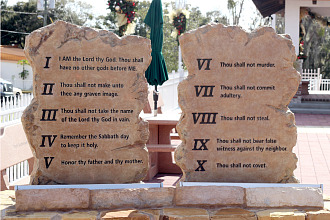Question: How do we read God’s name יהוה (YHVH) properly?
Answer: Originally writers of the Hebrew Bible did not use vowels. What we know today as vowels were added to the biblical text by a group of Masoretic Jewish scholars who lived and worked from the 5th to 10th centuries CE.
For example, the phrase “and he said” was originally written as ויאמר. When Hebrew became a spoken language, the majority of literate people were able to recognize that the consonants VYMR were supposed to be read “vayomer.” Later on, Jewish people encountered difficulties with reading because Hebrew was not their first language anymore.
The Masoretes solved the problem by adding cues to help readers. They wanted to keep the original biblical text untouched and at the same time provide enough information to the readers so that they could read the text. As a result, vowels and special marks were added: “וַיֹּ֤אמֶר.” The Masoretes carefully supplied vowels, accent marks, and even signs of cantillation which helped the Scriptures to be sung. One word was an exception. In Judaism sometime around the time of Ezra (500’s BCE, almost 1,000 years before the Masoretes,) God’s name stopped being pronounced by commoners and later even by the cohenim. It is impossible today to know for sure how to properly pronounce God’s name.
A very interesting and important observation is that nowhere in the books of the gospels, epistles, Acts, or Revelation is the name of God spelled out or used. Neither Paul nor any of the disciples tell us how it was pronounced. Even though Yeshua is quoted many times saying many things, including prayers and sermons, nowhere is He quoted using God’s name. If it was vitally important for us to know the pronunciation and to say it, certainly He would have told us how in the Lord’s Prayer or at some other point. But He chose not to. That point alone should end all speculation and dogmatic opinions on the matter.
But why do we see the vowels when we read the Hebrew Bible?
Since the Masoretes did not pronounce God’s name and substituted it with “Adonai” – the LORD - they took vowels from Adonai and vocalized the divine name with these vowels. Thus, we have יְהוָה. The Masoretic intention was to place a “stop sign” and to prevent readers from pronouncing God’s name. However, because of the lack of information people attempted to read this “hybrid” word and as a result we have “Jehovah” – but we don’t have proof that this is how it is actually pronounced. Some people believe it should be pronounced Yahweh, but they also don’t have any Biblical or literary proof that this is how it is actually pronounced.
Then how do we pronounce the Tetragrammaton properly? Let us imagine we use only consonants when we write English words. How do you read CHR? Maybe “chair?” Or maybe “choir?” Or “chirr?” Or “chore?” Or “char?” We may guess forever and this is the answer to the question.
What should we do? I suggest two things.
First, we should wait. Very soon Yeshua will come and reveal God’s true name to all redeemed people.
Second, in order to learn more we should learn Biblical Hebrew. Do you want to study for free? Begin now!















